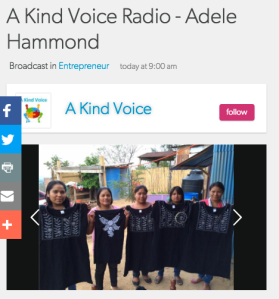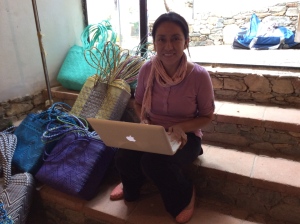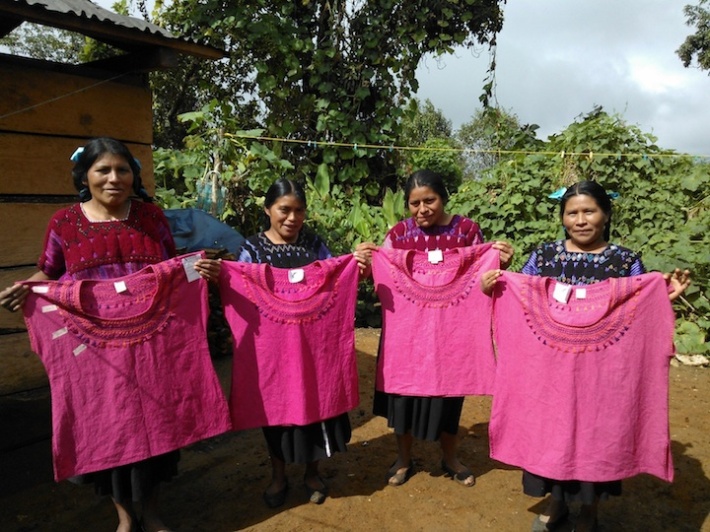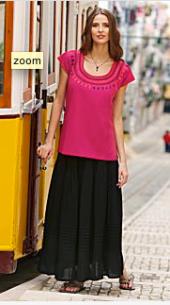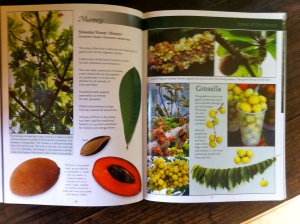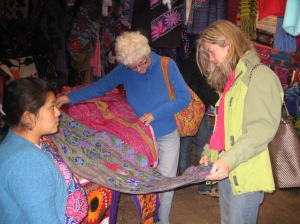|
||||||||
|
What Makes Abrazo Totes Special
Filed under About Abrazo Style, Fair Trade, Market Bags, Oaxaca, Uncategorized
What Makes Abrazo Embroidered Apparel Special
|
|||
|
Comments Off on What Makes Abrazo Embroidered Apparel Special
Filed under About Abrazo Style, embroidery, Fair Trade, Fair Trade Federation, Indigenous Mexican women, Mexican blouses, Mexico, Oaxaca, Wearable Art
A Kind Voice Radio Interview
A Kind Voice radio interviews our founder, Adele Hammond, about social entrepreneurship, fair trade, and what it takes to create handcrafted apparel and accessories for women in Oaxaca and Chiapas, Mexico.
http://www.blogtalkradio.com/akindvoice/2017/01/28/a-kind-voice-radio–adele-hammond
Filed under About Abrazo Style, Aid to Artisans, Doing Business in Mexico, embroidery, Fair Trade, Fair Trade Federation, Indigenous Culture, Living Abroad, Living in Mexico, Mexican blouses, Mexican textiles, Mexico, Oaxaca, Social enterprise, Textiles Oaxaca, travel/shopping in Mexico, Wearable Art, Women Artisans
Out of the Box
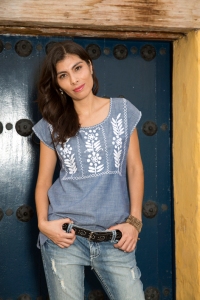
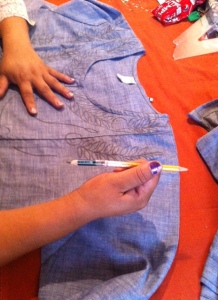 I started this post some time ago and as I finish it, I am reminded (mostly by others), that I need to pause to look back at how far we’ve come. I’m not very good at that but when I do take a moment I see a business with a growing number of passionate people who together are creating an exceptional collection of high quality, socially responsible, handcrafted apparel and accessories, despite the odds.
I started this post some time ago and as I finish it, I am reminded (mostly by others), that I need to pause to look back at how far we’ve come. I’m not very good at that but when I do take a moment I see a business with a growing number of passionate people who together are creating an exceptional collection of high quality, socially responsible, handcrafted apparel and accessories, despite the odds.
Our successes (and failures) over the past year resonate with the recurring theme of problem solving in virtually every aspect of what we do. Thinking out of the box (not recommended for those who aren’t in it for the adventure) is a prerequisite and patience, persistence and creativity in navigating cultures is the only way to get things done.
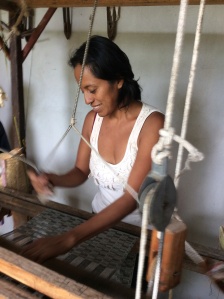
 In fact, recently, while driving down the road in Oaxaca contemplating where and how we were going to source the new plastic we needed for our totes after months of dead ends, it dawned on me while waiting at a traffic light that the truck in front of me was covered in signs advertising recycled plastic. I grabbed a pen and quickly wrote down the phone number on my hand as the light turned green. That evening I called the number, and miraculously, I was connected with someone who knew someone who could help. This is how we roll in Mexico. No amount of Google searches, phone books or even legwork will guarantee success.
In fact, recently, while driving down the road in Oaxaca contemplating where and how we were going to source the new plastic we needed for our totes after months of dead ends, it dawned on me while waiting at a traffic light that the truck in front of me was covered in signs advertising recycled plastic. I grabbed a pen and quickly wrote down the phone number on my hand as the light turned green. That evening I called the number, and miraculously, I was connected with someone who knew someone who could help. This is how we roll in Mexico. No amount of Google searches, phone books or even legwork will guarantee success.
We have experienced a rather stunning array of unpleasant surprises in this last year, comprised of tales from which great novels are written. Everything from jealous mistresses to corrupt government officials, plastic 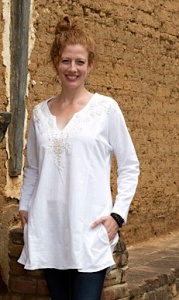
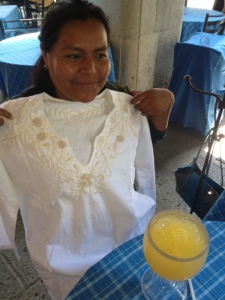 cartels to prolonged village fiestas have crossed our path and threatened our existence. Out of necessity we have invented our own manufacturing processes and sometimes even the materials to make our products. But here we are, another year under our belt, stronger, and growing steadily, despite the odds. We continue to learn, sometimes stumbling, occasionally flying, building Abrazo Style, brick by brick.
cartels to prolonged village fiestas have crossed our path and threatened our existence. Out of necessity we have invented our own manufacturing processes and sometimes even the materials to make our products. But here we are, another year under our belt, stronger, and growing steadily, despite the odds. We continue to learn, sometimes stumbling, occasionally flying, building Abrazo Style, brick by brick.
Looking back, yes, I see we have accomplished a lot but mostly I see the women, growing and learning, gaining greater self-confidence, happiness, and sustainability. That’s what makes all the rest of this crazy adventure worthwhile.
And rounding out this year, I would also like to thank Celina, my erstwhile assistant in Mexico (who has been
with me almost since the beginning), for all of her hard work, dedication and commitment to this venture as she leaves Abrazo for a new direction in her career.
Look for us on Facebook, Pinterest, and Instagram as Abrazo Style
An Inside Look with Adele Hammond: Embracing Contemporary Style and Handcrafted Traditions
Filed under About Abrazo Style, About Latin Threads Trading Co., Chiapas, embroidery, Fair Trade, Indigenous Culture, Indigenous Mexican women, Living Abroad, Living in Mexico, Mexican blouses, Mexican textiles, Mexico, Oaxaca, San Cristobal de Las Casas, Textiles Oaxaca, travel/shopping in Mexico, Women Artisans
A Radical Shift Toward the Future
It is an interesting conundrum building a business in a world where seasonal colors, tight delivery deadlines and demanding standards for consistency collide with the alternate reality of tradition and rural life of indigenous artisans of Oaxaca and Chiapas, Mexico.
As Abrazo Style grows we have confronted challenges that would make any ordinary fashion apparel company lock their doors and throw away the key. After all, it would be so much easier to just go to China to produce a blouse that would have convincing embroidery, consistency, and proper sizing. But for anyone who knows what we do, the process, the mission, and the result are intimately tied together.
Since my last post, we have taken on several very large customers whose names I don’t think I’m allowed to mention. One of them understands our mission and has been absolutely amazing in their patience while we “figured out” how to adapt the handmade blouse they chose for their catalog into a “production” blouse with 4 sizes and a consistent embroidery design. How hard could that be, right? Well, pretty hard, as it turns out. A different customer chose one of our totes for their high end apparel and accessories line and we were faced with reproducing EXACT designs for them on a very tight deadline. Fortunately, we were successful and the tote even made it into this month’s InStyle magazine.
As you might guess, Abrazo is evolving. Though our passion remains traveling the backroads of Mexico to discover the one-of-a-kind treasures our customers love, we are also inspired to reinvent tradition with an updated process and a line of clothing that is machine sewn, hand embroidered, and designed in 4 sizes for American bodies. So far, the ladies in Oaxaca and Chiapas love it and so do our US customers.
Our process may be evolving but women still work in their homes and their lives remain fundamentally the same with the exception that they are becoming more economically stable.
We, along with our artisans are challenged to make intimidating and unfamiliar changes in the future in order to grow, but so far we are making good progress (with the exception of some occasional VERY large bumps in the road ;-).
Straddling two worlds, centuries apart, with a shared goal of success requires perserverance and above all, a great sense of humor.
A Book Worth Having
Lots of things going on at Abrazo these days! We will update soon on our progress with our work in Oaxaca and Chiapas but in the meantime, a carrot….. If you’ve ever traveled in Oaxaca, the Yucatan or Chiapas, you are familiar with the strange fruits, odd trees and crafts that are unique to this region. Author Svetlana Aleksandroff of Playa del Carmen, Mexico, has recently produced a visual delight of a book that identifies and celebrates the flora, legend and craft of the Mayan culture. “Plants in the Mayan Culture” covers everything from coconuts to incense burners in its richly designed pages, walking the reader through the use and traditions surrounding plants in the regio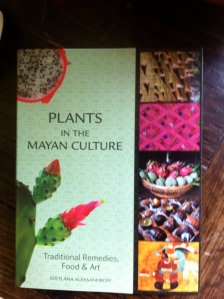 n of the Maya. Don’t look for literature but enjoy the visual feast. Check for availability in the US on their FB page: http://www.facebook.com/plantsinthemayanculture
n of the Maya. Don’t look for literature but enjoy the visual feast. Check for availability in the US on their FB page: http://www.facebook.com/plantsinthemayanculture
Filed under Chiapas, Indigenous Culture, Living in Mexico, Maya, Mexican Holidays, Mexico, Oaxaca, Uncategorized, WBTW
The Embroidered Box
A couple of weeks ago, Celina, my assistant in Oaxaca, informed me that a shipment of blouses we had been waiting for from Chiapas, Mexico had arrived. This was exciting for two reasons:
First, the women who make them live in a very remote pueblo where there are no phones and so our contact with them is difficult.
Second, we had asked them to make the blouses in a special way for us.
By “special” I mean we asked for them to NOT sew certain parts of the blouses together. I know that sounds odd but we
had been having such challenges with consistency in the construction of the blouses that we had decided it would be easier to finish them in Oaxaca with women we trained.
So, these blouses were to have the basic box shape, neck hole, and embroidered front with sides unsewn. Well, the blouses did come in as we had ordered with a little “bonus”…..what looked to be a large bite taken out of the sides of each blouse (maybe done with a knife?). When asked, it turns out they were trying to “help” us in determining where to stitch the arm hole…..sigh…..
That little added “detail” to the blouse altered the way we had to finish it, but in the end, we came up with something beautiful.
Consistency in sizing and patterning remains a huge challenge in these regions. In reality, these concepts are very foreign to indigenous artisans in Oaxaca and Chiapas, which seems especially odd considering how textile traditions have dominated these cultures for centuries.
So, we take the hard part out of the equation and deliver blouses that are sized and well adapted to our American bodies for them to embroider. Easy, RIGHT?
In Pursuit of the Holy Grail….Information
If you read this blog you are familiar with my stories of the challenges  involved in doing business in a foreign culture, especially in a developing country. Communication with the indigenous artisans we
involved in doing business in a foreign culture, especially in a developing country. Communication with the indigenous artisans we
work with is often fraught with misunderstandings and assumptions about time, quality standards, commitment, and trust. The results are often comical, and in the end, we almost always compromise and move on with faith that we are all learning.
However, there’s another ongoing, rather curious challenge: our quest for new information and people’s willingness to share it.
Question: “Have you seen this blouse before?”
Answer: “I couldn’t say.”
Question: “We were told Rosita Ortiz made it. Do you know her?”
Answer: “Ah, I don’t know.”
Question: Do you know anyone who could help us find her?”
Answer: “No”
Or: “Have you seen this fabric before?”
Answer: “Maybe.”
Question: “Do you know where we can buy this fabric?”
Answer: “No idea.”
And so it goes.
In general, the artisans we work with in Oaxaca and Chiapas communicate well with us in all matters concerning the work we do together except when it comes to sourcing materials or the maker of a new product we have discovered. Of course, this complicates our work immensely, as one cannot just pick up the yellow pages or Google the things we need in these rural areas. So we spend weeks tracking down the meager scraps of information we are provided, only to find, for example, that Rosita, the woman who made the blouse, is the sister-in-law of the person we originally asked, and the new fabric we are searching for is being sold only a block away behind an unmarked door.
I realized, eventually, that these roadblocks and detours are created in the interest of job security. They are driven by the understandable fear that comes from generations of poverty and the insecurity of not knowing what tomorrow may bring.
We have learned to respect this, and to expect the extra time it takes to earn the trust of the people whose skills we value highly. Working together, we can create more long-term opportunities for everyone.
A Few of my Favorite Things in San Cristobal de las Casas, Chiapas
This is by no means a “top 10” list (maybe we’ll just start with 5) but these are some of the things I love to do/eat on my regular
trips to San Cristobal for our work with indigenous artisans from the highlands. ( I will be back there in a week and no doubt will have more to add…)
1. Wander. It is such an amazing city, well preserved from colonial times with high points to climb to, back streets to explore, and unprecedented people watching…The indigenous people (the majority of the population), especially the women, still dress in traditional clothing of their villages. Men from the warmer lowlands walk the chilly high altitude streets bare-legged in hand woven tunics, and those from high altitudes walk the same streets in furry, sheep felt rugs that look like bear skins. —very fun and challenging to sort by their costumes, (see http://bit.ly/yBfkUg for a fabulous lo res pdf book about these people and their textiles by Chip Morris, currently only available at Na Bolom museum/B&B in San Cristobal).
2. Eat French pastries. Not to be missed on the Real Guadalupe, made by real French people!
3. Cruise the markets… WOW! Santo Domingo (every day though the government is threatening to relocate it), the Mercado de Dulces (an indoor sweets and craft market, great on any day but especially rainy days) are the two big ones.
4. Slurp frozen yogurt sticks at the creamery (right) off of Real Guadalupe where there is also a daily vegetable market, hmm, near where the walking street ends).
5. Visit the locals market. (You can find it in any guide book) Huge and full of interesting things to see, but, like any market, be vigilante for pick pockets, etc. and be careful about taking photos. Many people take great offense at taking pictures of them or even their wares. Ask (you will probably have to pay) but even if you just wander through, it is fascinating.
More stories and pictures in a few weeks!






